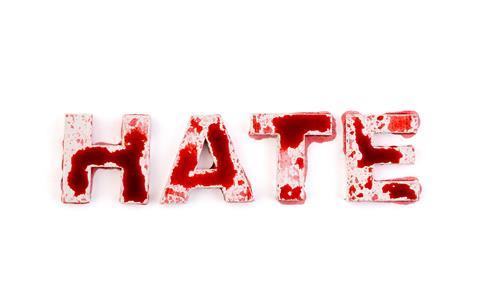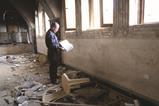Dangerous extremism is on the rise among all political tribes. Heather Tomlinson is urging Christians to act and pray now, in order to counter the rising tide of hate

You may be blissfully unaware of what I believe is an emerging crisis.
If you and your inner circle are (wisely) not on social media, or live in an area that is secure from riots, protests and strife, it might sound like I am being alarmist in the words that follow.
However recent events have brought these trends into the attention of more people: the riots against immigration; the riots in Harehills, Leeds and the pro-Palestinian protests.
Videos of hate-fuelled speech and extremism from all the various ‘tribes’ involved in these conflicts do the rounds on social media – although you may have only seen the ones that fit the narrative of your own particular echo chamber, because that is how social media works. Witnessing extremism on one ‘side’ then fuels the same descent into hatred of the opposite tribes.
Whichever political or community group you might support, it seems as though there is someone espousing hatred towards it: men or women, gay or straight, left or right, white or black, immigrant or those whose heritage is British. Muslim, and, of course, Christian.
Horrors such as the election of the Nazis in Germany or the Russian revolution did not emerge out of nowhere, and if we want to avoid their revolting consequences, the time to act is now.
I believe a widespread radicalisation and tendency towards extremism is taking place, including in those who call themselves “Christian”. I know this is a bold claim, and that terms such as ‘extremism’ and ‘radicalisation’ have been over-used (sometimes being unfairly thrown at Christians who merely hold orthodox, traditional views on abortion, sexuality and other religions, for example).
Extremism on the left
I first noticed extreme or hateful attitudes coming from the left wing of the church when Donald Trump was first running to be US president. The amount of hatred being expressed by some Christians toward him shocked me. The level of demonisation was unlike anything I’d seen before.
Trends toward ‘social justice’ or ‘anti-racism’ - that have good intentions and appear positive on the surface – have become extreme in places. Even in mainstream parts of the Church hateful ideas have become institutionalised and justified. Anglican Archdeacon Miranda Threlfall-Holmes wrote on X earlier this year: “Let’s have anti-whiteness, and let’s smash the patriarchy.” The same denomination advertised for a “deconstructing whiteness officer”.”
There has been growing antisemitism among parts of the left for some years, and this is often dressed up as mere concern for the Palestinians. Rev Stephen Sizer was criticised for alledged anti semitism for a number of years (which he strongly denies). Last year Sizer was defrocked for sharing “virulently antisemitic” content online and encouraging “conspiracy theories”. The Archbishop of Canterbury said Dr Sizer’s behaviour had given “encouragement to conspiracy theories and tropes.”
Some of this reflects wider society. There are a number of public figures who believe it is morally justifiable to be “anti-white” and/or “anti-Zionist” and the rhetoric has amplified as a result. Meanwhile, politicians express fears over intimidation from Islamists and appear to be afraid to challenge militants who have been emboldened by the rhetoric and support in the pro-Palestinian marches. The subtle, complex and difficult separation of ‘moderate’ Islam from its militant version is often not understood or made well, leading to hatred towards innocent Muslims, too.
Extremism on the right
Angry extremism is snowballing on the right in an alarming way. In the past year I have encountered many examples of online accounts, usually anonymous, claiming ‘Christianity’ but who are explicitly antisemitic and racist, for example expressing disgust at ‘Jewishness’ or the reality that Jesus was Jewish and describing black people as sub-human, or blaming every criminal act on immigration, or expressing hatred towards “libtards”.
Candace Owens, an American provocateur who morphed from anti-Trump liberal to pro-Trump critic of ‘wokeness’, has recently expressed some alarming opinions on Israel. Her father in law, Lord Farmer, was concerned enough to publicly counter her words with support for the Jewish people and warn of the resurgence of hatred. “[The Holocaust] could happen anywhere - such sadism lay dormant in the heart of everyone.” he said on X. He is the Christian Deputy Chair of the Council for Christians and Jews.
Examples proliferate. Dr David Wood, a popular YouTuber who I interviewed about his extraordinary conversion story in 2016, is now expressing support for the controversial anti-immigration provocateur and critic of Islam Tommy Robinson. Similarly, Calvin Robinson, who was also previously interviewed by this magazine, has become more extreme in his views. He recently wrote on X, “Yes, we need Reconquista [the name for the military campaign to remove the conquering Islamists from Spain in the 15th Century]. Yes, we need to remove Islam from Britain.”
This rhetoric is fuelling anger and more hatred in others. This is a likely reason that a third of our population believe we will see civil war in this country in the next 10 years, according to a recent YouGov poll.
Personal biases
I don’t particularly want to single people out or point fingers. But we have to be aware of growing extremist voices, especially when they are claiming to share our Christian faith.
Ultimately, I think the answer is first, to look within. In the examples above, no doubt you will have more or less sympathy with one point or another. Depending where you sit on the political spectrum, you might think “white privilege” is a huge societal problem; or you might have sympathy with conservatives who are increasingly denouncing mass immigration or you might think the criticism Israel is receiving is entirely justified.
Few Christians are without their own biases, prejudices, and even hatreds, common to their own political ‘tribe’. If these are left unexamined, I believe that the current trend of misunderstanding and rising anger will continue on all fronts and we will be sucked in. Perhaps the relevance of Christ’s teaching of loving our enemies is obvious, but it needs more urgent attention – especially when hatred is window-dressed as “righteous anger” and justified using Christian language.
Examining ourselves
I believe a vital teaching of Jesus for our times is the log and speck of Jesus’s words in Matthew 7:3-5: “You hypocrite, first take the plank out of your own eye, and then you will see clearly to remove the speck from your brother’s eye.”
We need to ask God for pure hearts, and repent until we receive this and have genuine love for all – Muslims and Jews, right wing and left wing, Trump and Harris, Israelis and Palestinians, Starmer and the next Tory leader. Fast if it’s not happening. Gather Christians to work on this together. I’m not there yet personally, but I do believe it’s the answer.
Some of the problems the “extremists” claim to address: racism, violent Islam, unjust wars, the immigration crisis etc – are indeed urgent. But only when we are personally free of our own partisan rage and resentment, and transformed by God’s love, can we produce good solutions for these difficult truths with his guidance and wisdom.
Learning from stories of transformation
I also believe it is helpful to listen to people who once aligned with these various causes but realised they were heading down the wrong path.
Adam Coleman, a US-based writer, wrote “I Was Radicalized By Online Leftist Content: But Reality Brought Me Back.” He reflects on his Substack: “When I focused on all of the kind and wonderful people of all racial backgrounds who were kind to me, it completely overshadowed the negative people I had encountered throughout my life. After weeks of building animosity and paranoia about white people, I let it all go… The most radicalised tend to be isolated in the real world and they make up for their lack of human connection by building online communities.”
On the other end of the spectrum, I recently interviewed two people who were involved in far right extremism; Joseph Pearce who came out of the National Front in the 1980s and changed his worldview after exploring faith through Christian literature. A more recent example was Theo Wilmot, a former activist in the far right Patriotic Alternative, whose story is very instructive for how the Church can approach people who are labelled “extremists”. Firstly, he was in great personal pain when he got interested in the far right. Secondly, he believed what he was doing was well-intended. Thirdly, after he personally rejected fascism and had a breakdown, it was the simple basics of prayer, reading the Bible and loving acceptance from Christians of other cultures that helped him to come to faith and see Christ in others.
I personally never got to the stage of wanting to “smash the patriarchy” but I’ve talked about my own shift away from angry feminism and angry left wing beliefs through Christian faith.
Reaching out with love
The Church needs to unite and be willing to discuss these problems openly, humbly and without condemnation of differing views – including the controversial ones - and with urgency.
If public Christian figures are openly espousing hatred or delusional conspiracy theories, then we need to work towards loving discussion and humble correction - not performative, self-righteous statements - even if we openly disagree. The reasons why that person has developed that way of thinking - both personal and societal - need to be considered rather than brushed under the carpet, and dialogue needs to occur ‘behind the scenes’.

No doubt this happens quietly. At least, US Jewish Christian Dr Michael L Brown recently wrote on X to Owens: “Candace, please, let’s talk, privately or publicly,” linking to an article he wrote about her antisemitic conspiracy theories. I’m sure Lord Farmer is raising the issue privately around the family dinner table.
Ignoring these grave difficulties is not an option. A common meme online is that of a smiling dog sat in a burning room saying “this is fine.”
Everything is not fine, and we need to pray, talk and act if we don’t want the house to burn down.





































3 Readers' comments